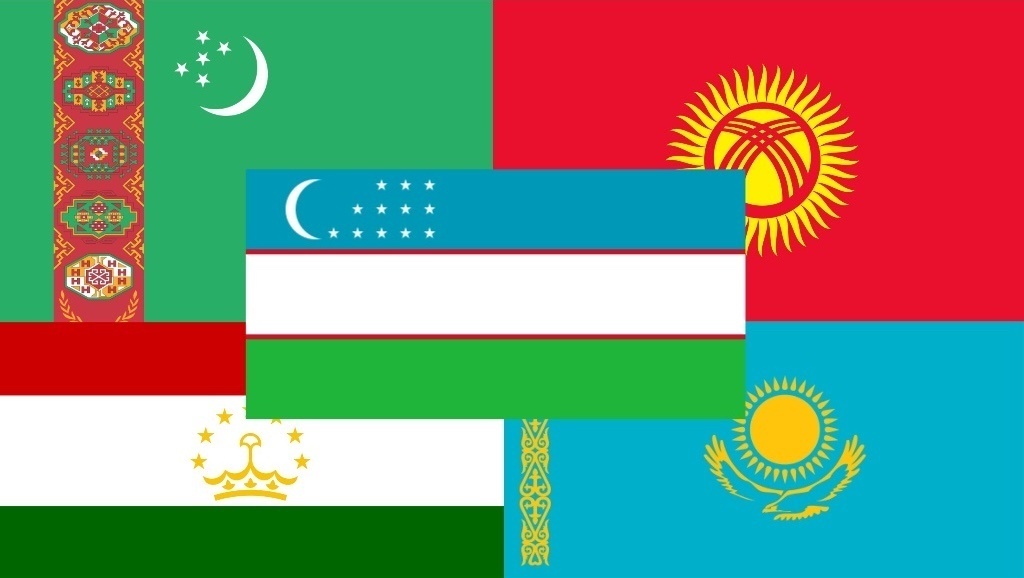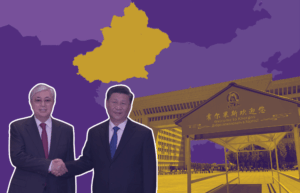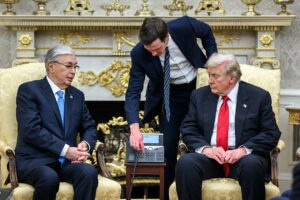Coronavirus, border clashes, a political crisis in Kyrgyzstan… Central Asia had a turbulent 2020. Here is Novastan’s overview.
In Central Asia as in the rest of the world, 2020 was the year of the Covid-19 pandemic, which pushed the region’s health systems and economies to breaking point. But numerous other issues also made headlines, from border conflicts and environmental concerns to violence against women and the political crisis in Kyrgyzstan.
Want more Central Asia in your inbox? Subscribe to our newsletter here.
There was some good news, too, with the region producing exciting cultural projects, some progress in biodiversity and growing social engagement in many places.
Kazakhstan: coronavirus, political appointments and snow leopards
As in the previous year, Kazakhstan’s government was put to test in 2020. At the beginning of the year an interethnic conflict in southern Kazakhstan between the local Dungan minority and Kazakhs rocked the country. Thousands of Kazakhs are said to have raided several Dungan-settled villages in the incident, killing 11 people.
Initially, the official line was that the violent confrontation had been sparked by a personal argument. The Dungans, however, see the events as a pogrom. The investigations indicate that many drug smuggling criminal gangs were involved. The criminal prosecution did not bring the nationalistic nature of the clash to light.
But the incident did not get mainstream attention for long, as containing the coronavirus dominated the political agenda from the beginning of March. Kazakhstan has the highest official number of infections in Central Asia. After gradually shutting international transport routes, the authorities declared a state of emergency and a nationwide lockdown in March. Social life was at a standstill until May, with some large cities cordoned off. The online publication Kurziv.kz published photos of a nearly deserted Almaty in March.
After a brief relaxation of measures at the beginning of summer, a second wave of infections swept the country in July and August. The government took measures such as financial aid for low-income families and controlling food prices. Nevertheless, the pandemic put the health and education sectors under serious pressure, especially after years of underfunding.
Resignations and appointments were also cause for surprise this year. In April, Gulshara Ábdiqaliqova became the first female governor in the history of Kazakhstan. This historic step showed a general increase in the amount of trust placed in women who hold positions of political power.
However, the dismissal of the chair of the Senate Dariģa Nazarbaeva by President Qassym-Jomart Toqaev made for bigger headlines. Nazarbaeva is none other than the daughter of the former president, Nursultan Nazarbaev, who continues to play an important role as chairman of the Security Council of Kazakhstan. This fueled rumours of internal disputes in the government and of Toqaev expanding his power. However, how much, if at all, the power relations of the Nazarbaev system will actually change remains to be seen.
In the area of environmental protection, Kazakhstan has a mixed record for 2020. On the one hand, the water shortage worsened, so the fate of Lake Balqash is increasingly like that of the Aral Sea. In addition, the Caspian Sea reached its lowest water level in 30 years and parts of Kazakhstan were affected by a locust storm this summer.
On the other hand, animal protection activists were delighted with the first photograph of a snow leopard and its cub in 30 years at Lake Almaty. The snow leopard is an endangered species and a victim of poaching and displacement. It was not until October that the government decided to impose harsher sanctions on environmental crimes and provide more comprehensive environmental education, so that other animal species may find their way back into Kazakhstan’s natural environment.
Kyrgyzstan: a year of economic and political crisis
If 2020 was a year of crisis all over the world, this is true several times over in Kyrgyzstan. Throughout the winter, the country’s media was filled with reports about the catastrophic air pollution levels in the capital Bishkek, which at times had the worst air in the world. This is a seasonal problem mainly due to heating and its climactic conditions. It is thus no surprise that it came back just as acutely at the end of the year.
Other social problems have persisted. Two murder cases caused an uproar at the beginning of the year and once again drew attention to violence against women in Kyrgyzstan. Despite one of the most progressive legislations in the post-Soviet space, such cases seem to be increasing. That certainly has to do with a lack of political will: on 8 March, after attacks by nationalists, participants in a women’s march against violence ended up in the police station themselves. On the institutional level, reforms such as the current 30 percent quota for women in elections, are not being respected.
At the regional level, there were several escalations of the border conflict with Tajikistan in the south of the country in 2020, as there had been in 2019. An exchange of territory announced in January looks to be at a standstill. At the end of May, there were also violent incidents on the border with Uzbekistan.
As with other Central Asian countries, the first coronavirus cases in Kyrgyzstan were registered relatively late, in March. Due to a strict quarantine early on, the number of cases was kept within limits for several months, but the relaxation of the measures revealed the catastrophic state of the public health system, with a high number of infections among medical staff. The country has been experiencing a second wave since October, but without a strict lockdown in place.
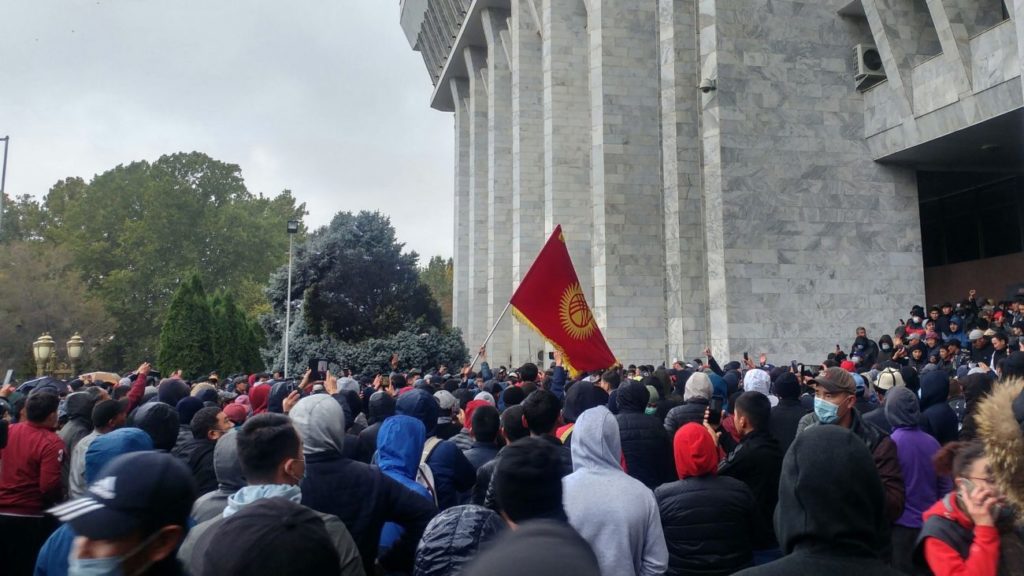
Various long-held frustrations of this kind, fueled by a corruption scandal that was uncovered at the end of 2019 and deepened by later reports, resulted in a widespread political crisis after the parliamentary elections in early October. After protests, the election results were cancelled, the president resigned and Sadyr Japarov, a national populist freshly released from prison, was the favourite for the presidential election. He received nearly 80% of the vote on 10 January 2021, but with low turnout. A controversial constitutional amendment is also on the cards for 2021, after Kyrgyzstanis voted for a presidential system of government in a referendum, also on 10 January 2021.
Read more on Novastan: Kyrgyzstan elects Sadyr Japarov and opts for presidential government
There are bright spots in sport and culture. For example, the wrestler Aysuluu Tynybekova once again became world champion in her weight category in December and the MMA athlete Valentina Shevchenko defended her UFC world flyweight title for the fourth time in November. The year also brought several musical highlights, including high-quality new rap releases in Kyrgyz and Russian, an album by the producer Jaya, and a new world record for the longest recitation of the national epic, the Epic of Manas.
Tajikistan: a very predictable election
2020 was the year of elections in Tajikistan. On 1 March, the citizens of the country were called upon not only to elect the members of the regional parliaments and city councils, but also to vote on the composition of the national parliament. The parliamentary elections produced predictable results: President Emomali Rahmon‘s ruling People’s Democratic Party received more than 50% of the second vote, while the only authorised opposition party did not get a single seat due to receiving less than the minimum 5% required.
The country then held a presidential election on 11 October, and Rahmon, who has been in power for 28 years, emerged victorious with 90.92%. Without any real opposition candidates, there was no doubt about the outcome. The only question was whether Rahmon would run again or leave the field to his son Rustam Emomali. The latter, who has adopted his father’s first name as his surname, became a senator at the end of March and was elected president of the Senate only a few weeks later. This had led to speculation that 2020 was the year he would inherit his father’s position.
The coronavirus also hit Tajikistan hard. The country officially reported its first cases of infection on 30 April, around a month and a half later than its neighbors. There were considerable doubts about the authorities’ honesty on the subject long before that. Nevertheless, mass events such as the celebration of Nowruz, the Persian new year, were not cancelled. The Tajikistani football league also earned itself new international fans by keeping the game going until May, one of a handful of leagues anywhere in the world to keep playing this late into the pandemic. After the first official Covid-19 cases, the number of infections and deaths rose rapidly, leading to the dismissal of Health Minister Nasim Olimsoda.
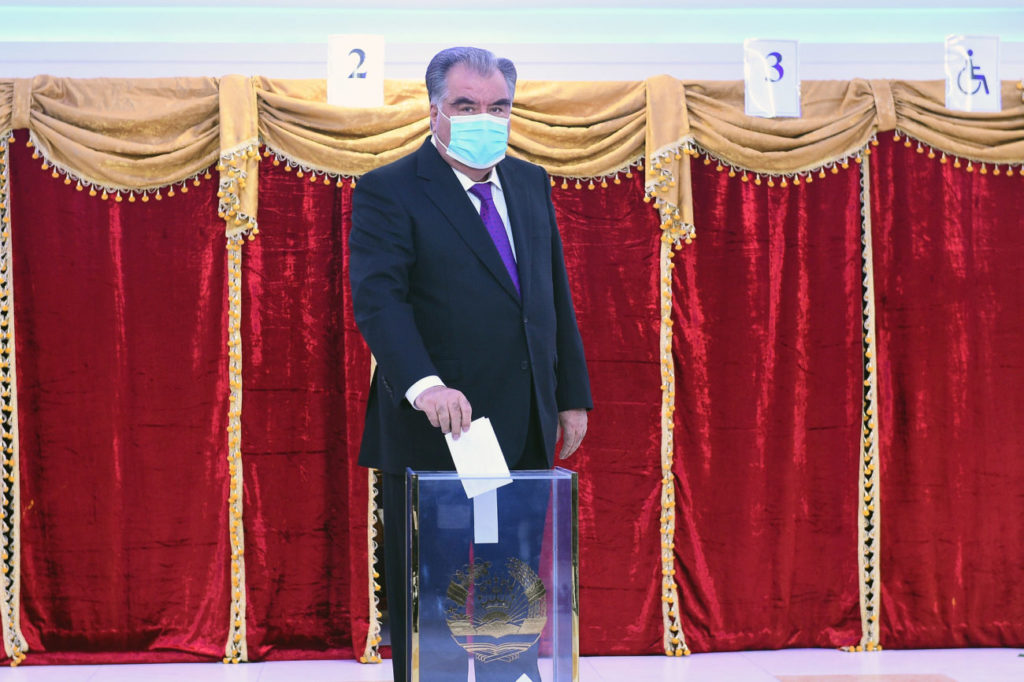
There were regular violent clashes on the Kyrgyz-Tajik border in the Fergana Valley. On 8 May, Tajik border guards were injured, whereupon they shot back with mortars, injuring three Kyrgyz soldiers. On 24 May, a dispute over pastures led to another exchange of fire between border guards. A 19-year-old Tajik soldier was injured. On 6 August, a Tajik villager from Vorukh, a Tajik enclave in Kyrgyzstan, was shot dead. The border conflicts in the Fergana Valley have been ongoing for years. On the other hand, there is positive news from the Tajik-Uzbek border, where demining has now been completed.
On the economic side, Tajikistan surprised many by looking for private investors for two of its most important companies, the aluminum producer TALCO and the Rogun hydropower plant. A 2009 law previously prevented them from being at all privatised. Rogun has suffered for years from funding difficulties, though loans from two European banks, announced in November, may bring respite.
Turkmenistan: what pandemic?
Officially, there are no cases of coronavirus in Turkmenistan. The country even held mass events including Victory Day celebrations on 9 May. Yet its government took measures clearly aimed at preventing infection, revealing all is not as well as they would like: recommending residents wear a mask and wash their hands, temporarily closing shops and other gathering places, restricting internal travel, and, more recently, cancelling New Year’s celebrations in the capital, among others. Radio Azatlyk, RFE/RL’s Turkmen branch, describes overwhelmed hospitals turning away patients, with COVID-19 symptoms officially explained away as ‘pneumonia’.
Disinformation about the crisis has not made it any easier to know what is really going on. On 31 March, for instance, RSF reported that Turkmenistan had banned the word ‘coronavirus’ when even Turkmenistan Today, the state news agency, had already published articles about the virus.
As Eurasianet points out, the population also had food shortages to worry about. News websites Chronicles of Turkmenistan and turkmen.news (respectively based in Vienna and Amsterdam) reported in November that the authorities were rationing bread in the cities of Mary and Turkmenabat. Even residents of Ashgabat, the capital, are complaining of bread shortages.
The dollar was selling for 19.10 manat on the black market in January against 27 manat on 13 December, according to Chronicles of Turkmenistan.
There was some good news on the environmental side with the country committing to protecting migratory animals by ratifying the Bonn Convention and taking measures to safeguard biodiversity as a party to the UN’s Nagoya Protocol. At the same time, new methane leaksreported by the French data analytics company Kayrros in October show the gap between official commitments and reality.
The climate also had a more direct, and destructive, effect. According to turkmen.news, residents of Turkmenabat, in the east of the country, took to the streets to protest the government’s inaction after rainstorms damaged houses and left many in the surrounding region without electricity. Rainstorms hit the Lebap region on 4 April and 13 May, in addition to a hurricane on 27 April.
Parliament became bicameral through a constitutional amendment on 25 September. The new upper house is known as the Halk Maslahaty (“People’s Council” in Turkmen) and is composed of 56 members. Changes to article 76 also make the speaker of the Halk Maslahaty the new head of state should the president be unable to fulfil his duties, a move some view as part of a transition strategy for the president, Gurbanguly Berdimuhamedow.
Finally, Berdimuhamedow once again caught the eye of international media, this time by unveiling a huge gilded statue of an Alabai dog in Ashgabat on 10 November.
Uzbekistan: major projects in spite of the pandemic
Despite a global pandemic, Uzbekistan forged important economic and public-private partnerships. Car manufacturer PSA, who quickly disappeared from the country after an unsuccessful attempt, was supplanted by Volkswagen in March. On the other hand, the French companies Total, Suez and Veolia launched energy projects. As in 2020, Apple and Netflix have voluntarily decided to pay Uzbekistan’s VAT. At the same time, most the tourists stayed away this year, a hard blow for this important economic sector.
Authorities declared two lockdowns in connection with the pandemic. As of 13 January 2021, the country reported over 77,000 cases and 618 deaths.
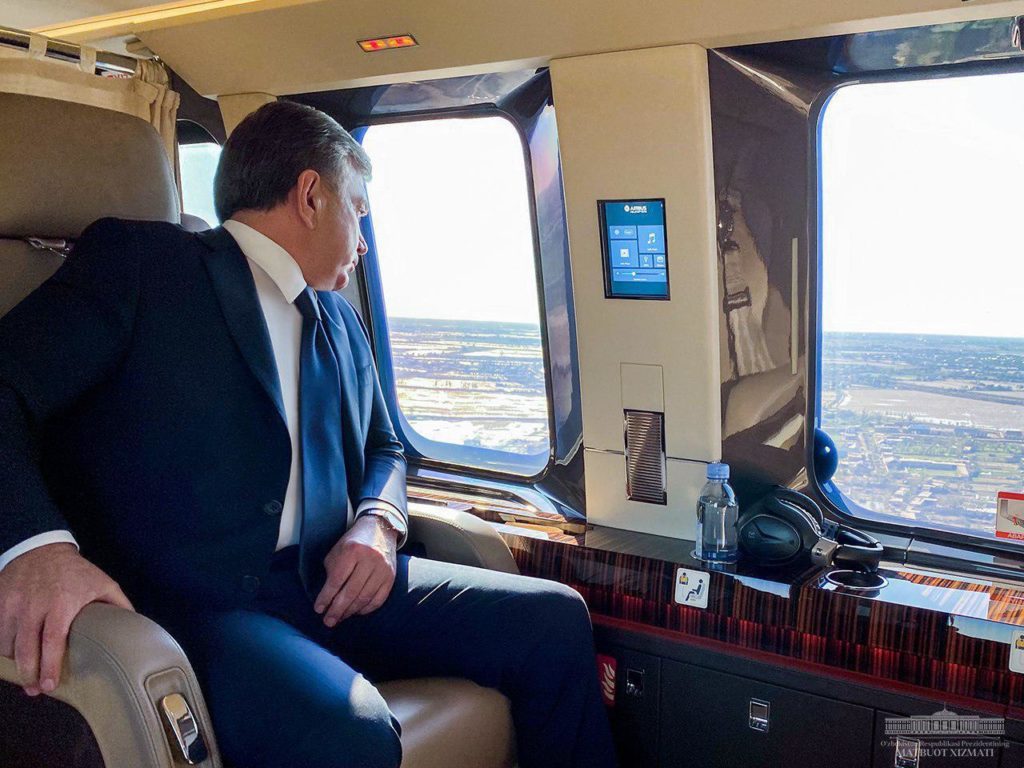
In terms of ecology and biodiversity, the situation in Uzbekistan, as in all of Central Asia, is difficult. Climate change is hitting the steppe and land hard, with periods of exceptional heat of up to 44 degrees Celsius in May. There are some positive signs, however, as the country established a nature reserve and some endangered species have reappeared.
Uzbekistan also launched major projects in the fields of energy and transport: for example, it plans to build one the world’s largest wind turbines and has relaunched the China-Kyrgyzstan-Uzbekistan railway project.
Socially and culturally, the situation remains tense. Uzbekistan’s cultural attractions, regardless of age, are still under threat from the lure of supposedly more lucrative projects: Tashkent’s Ilkhom Theatre was under threat of eviction while Samarkand’s construction boom threatens some of its historic treasures. However, there is timid progress in the field of human rights and media pluralism. A new human rights organisation has been authorised, a first since 2003.
However, these efforts should not mask significant failures in opening up political life. In March, two opposition parties were unable to run in the parliamentary elections, which were won by the president’s party. Human Rights Watch also criticised the European Union’s rapprochement with Uzbekistan.
Uzbekistan’s relationship with its neighbours changed little in a year marked by border closings due to the pandemic. The Uzbek-Tajik border was finally cleared of landmines last February, but relations with Kyrgyzstan are, as in previous years, tense. In December, Uzbekistan received observer status in the Eurasian Union, which in Central Asia already includes Kazakhstan and Kyrgyzstan.
Jana Rapp, Florian Coppenrath, Robin Roth, Clément Clerc-Dubois, Valentine Baldassari and Tommy Hodgson
For more news and analysis from Central Asia, follow us on Twitter, Facebook, Telegram, Linkedin or Instagram.
 Central Asia in 2020: the year in review
Central Asia in 2020: the year in review 
